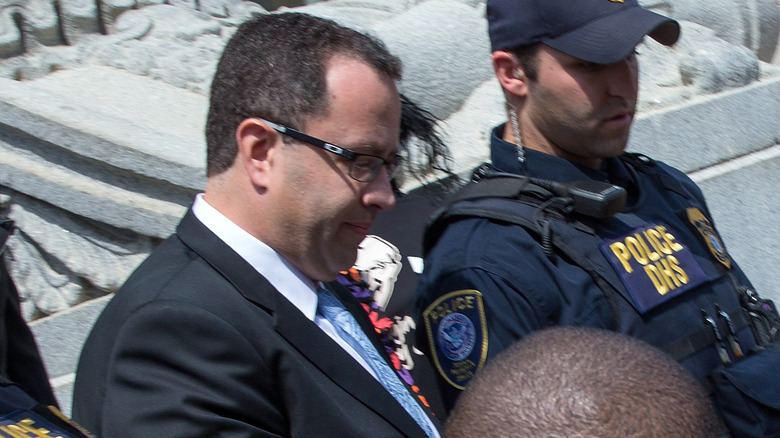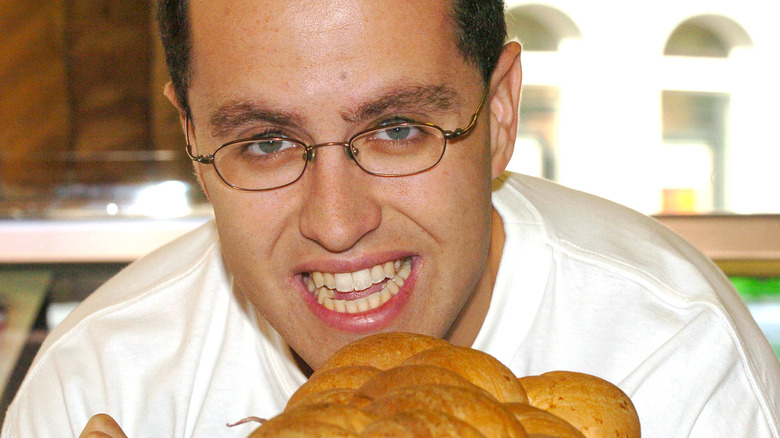What Jared Fogle's Life In Prison Is Really Like
Jared Fogle, once the face of Subway restaurants, tearfully apologized. "I so regret that I let so many of you down," he said (via The Indianapolis Star). It was November 19, 2015, and Fogle was about to be sentenced in federal court in Indianapolis on charges that he kept and traded child pornography and had sex with underage girls. His fall from grace had been startling. He'd made millions of dollars as the sandwich chain's pitchman after losing hundreds of pounds on a diet that included Subway sandwiches. He was often photographed smiling while holding up a pair of the size 60 pants he used to wear.
"What a gift, to have such a professional windfall fall in your lap," U.S. District Judge Tanya Walton Pratt said during sentencing, telling Fogle he'd thrown it all away for a double life. Pratt sentenced him to 15 years and eight months in prison for his crimes. Fogle, who is now 46, is serving his sentence at a low-security federal prison in Littleton, Colorado, prison records show. There he attends sex offender counseling. He also works out, reads, and watches sports on TV, he said in a 2021 leaked letter (via the New York Post).
In the system
Following sentencing, the Federal Bureau of Prisons sent Jared Fogle to the Federal Transfer Center in Oklahoma City. The prison is the first stop in an inmate's journey in the prison system. This would have been a new experience for Fogle since he'd been on house arrest before his sentencing. A month after Fogle arrived at the prison, the BOP, following the court's wishes, transferred him to the low-security FCI Englewood in Littleton which offers sex offender counseling, per The Indianapolis Star.
The 320-acre facility, built in 1938, houses nearly 800 inmates. The men must wear khaki prison-issued clothing, are subject to a minimum of two roll calls a day, typically work a job within the prison from morning until afternoon, and receive recreational time, per the prison handbook. Fogle, because he's a sex offender, is additionally required to participate in counseling. Soon after arriving there, he would learn that life in prison can be perilous.
Beaten in prison
On January 29, 2016, a fellow inmate attacked Jared Fogle while they were in the prison's recreation area. Steve Nigg said he beat Fogle because the other sex offenders revered him. "Jared is their hero," Nigg wrote in a letter obtained by TMZ. "You would not believe how arrogant Jared was. He hired bodyguards and the other child molesters looked at him as if he was a god." Fogle was left with a bloody and swollen face after Nigg's attack. The prison put Nigg, who was then 60, into solitary, extended his sentence, and transferred him to another prison.
Nigg didn't believe sex offenders should be allowed to serve their time in a minimum-security prison. "What he wanted to do was send a message and he did," Nigg's nephew Jimmy Nigg, told the Washington Post. "If he wanted to kill Jared Fogle, he would have been able to, and he didn't. No one stopped him from assaulting Jared. He sent the message, and he walked away."
Appealed sentence
In August 2015, Jared Fogle took a deal with federal prosecutors in which he pleaded guilty to one count of possession and distribution of child pornography and one count of traveling over state lines to have paid sex with underage girls, according to CNN. Federal prosecutors promised not to ask the court for a sentence of less than 13 years. But Judge Pratt determined Fogle's behavior showed an "extreme" level of "perversion and lawlessness" and warranted a longer sentence than the prosecution asked for and that also exceeded the federal sentencing guidelines by more than a year.
Fogle appealed the sentence on the grounds that Judge Pratt was "unduly influenced by" Fogle's ties to Russell Taylor, who headed up Fogle's anti-obesity foundation and with whom Fogle had shared child pornography, per the AP. Taylor, who is serving a 27-year prison sentence, had molested and secretly recorded minors in his home. A federal appeals court was unswayed by Fogle's argument and found Pratt's sentencing was "substantially reasonable" given the "disturbing facts of the case."
Sovereign citizen defense
Unhappy with the appeals court's decision, Jared Fogle, without the help of a lawyer, attempted to appeal his conviction to the same court where he had been sentenced. This time he relied on a "sovereign citizen" defense, alleging the federal courts have no jurisdiction over him. This is the same defense convicted killer Darrell Brooks attempted to use at his trial. Brooks plowed into a crowd during a parade in Waukesha, Wisconsin, in November 2021, killing six bystanders and injuring 61 others. The defense didn't work for either Fogle or Brooks.
"If Fogle is now claiming to be 'sovereign', the Seventh Circuit has rejected theories of individual sovereignty, immunity from prosecution, and their ilk," Judge Tanya Walton Pratt, who had originally sentenced Fogle, wrote in her November 2017 decision. "Regardless of his theory, Fogle's challenge of this Court's jurisdiction is rejected." Fogle has continued to appeal his conviction and even attempted to sue the federal government for $57 million in 2018, claiming he was the victim of a "conspiracy," per KTNV.
Leaked letter
In a leaked letter from November 2021, Jared Fogle told an unnamed correspondent that he was "the most healthy and in shape I've ever been" weighing in at 180 pounds. He runs "four to five miles a day" and stays away from junk food. "I snack on granola bars and protein bars," he wrote. "I feel really good physically and mentally." He said working out is one of the things he can control in a prison system in which he doesn't have "a lot of control" over his life.
In the letter, he also discussed other ways in which he passed the time, including watching NFL games on TV and reading The New York Times and historical novels. "I still love to laugh and smile," he said. Fogle admitted he "royally screwed up," that he was "selfish and entitled" and "thinks about all the people I've let down." Fogle's earliest release date is March 24, 2029. "All I can do is learn from my stupid mistakes to be a better man when I get released in a few years," he wrote. Steven DeBrota, the former assistant U.S. attorney who prosecuted Fogle, told the Post Fogle ended up in prison because of a "long-standing and persistent pattern of criminal behavior" and not a single mistake.





